Published Sep 20, 2016
Catching Up with Alexander Siddig, Part 1
Catching Up with Alexander Siddig, Part 1
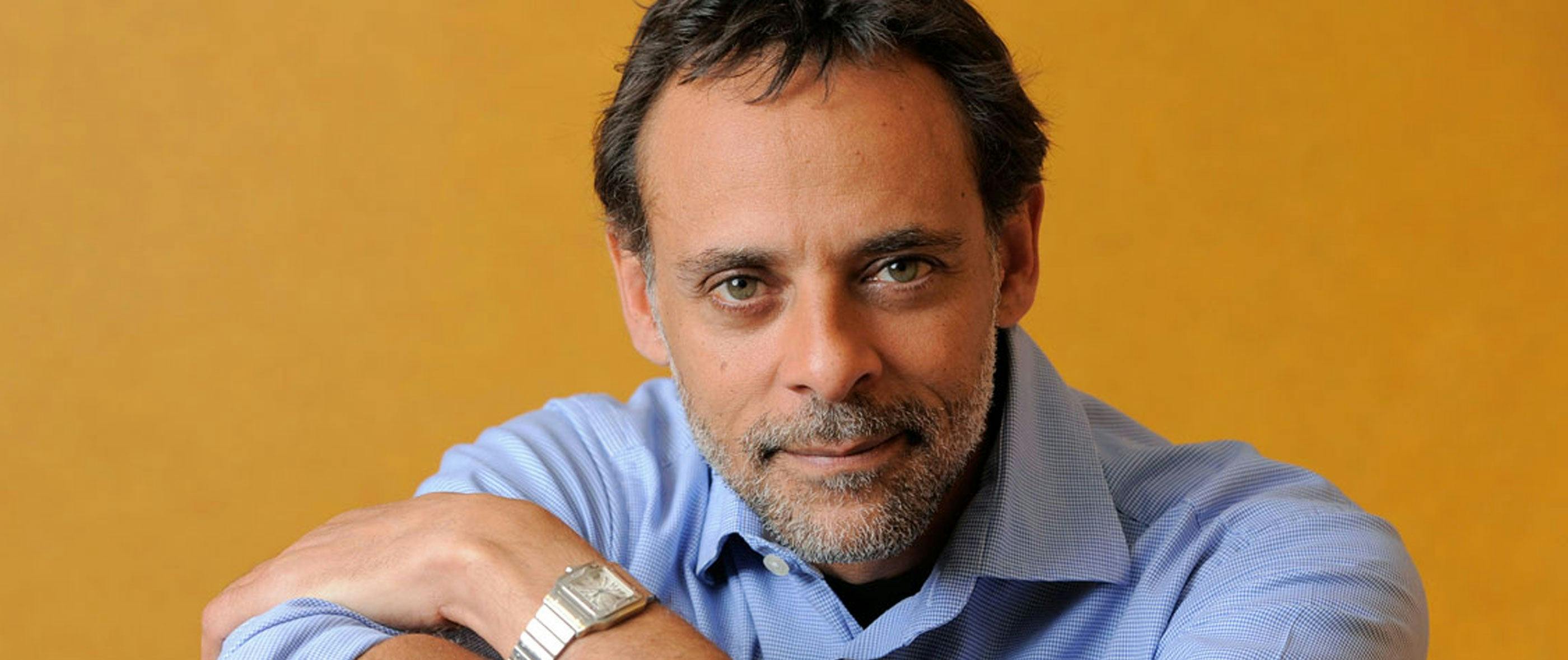
That blur you saw may very well have been Alexander Siddig zipping from one project to the next. Really. Siddig, who was known as Siddig El Fadil for much of his run as Dr. Julian Bashir on Star Trek: Deep Space Nine, is everywhere. He died a horrendous death as Doran Martell on Game of Thrones, co-stars on Peaky Blinders and just wrapped production on The Kennedys: After Camelot, a miniseries set to air next year. He even co-starred in a series pilot, Recon, that sounded fascinating, but failed to receive a pickup. And, yes, Siddig occasionally finds time in his schedule to appear at a Star Trek convention. In fact, he’s set to touch down in Birmingham, England, next month for Destination Star Trek Europe, which will be held October 7-9 at the NEC Birmingham. StarTrek.com recently chatted with Siddig about his current projects, DS9 past and appreciation for fans and conventions. Below is part one of our conversation, and visit StarTrek.com again tomorrow to read part two.
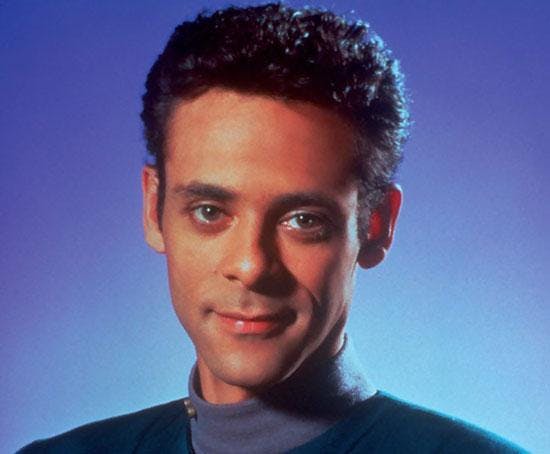
Let’s start with two Star Trek questions, then talk about your new roles, and then we’ll come back to Trek again. You still attend the occasional convention, such as the upcoming Destination Star Trek Europe. You’re not like Marina Sirtis, who is the convention queen, but you still go to one or two a year. How do you enjoy getting together with your colleagues, and are you finding a new generation of fans are discovering the show?
A new generation of fans has definitely discovered the show. In this era when we can get whatever we want whenever we want it, Star Trek is one of the perfect shows for that, because it has a longevity that most other shows don’t. Because it’s not based on fashion, no one has flares, so it doesn’t really date as easily as other shows. And people just love the ethos behind Star Trek and what Gene Roddenberry dreamt up. I will go to conventions because A, I really like the fans, I really enjoy hanging out. There are a few fans that I have seen for years and years and years, and I am very comfortable amongst them. I mean, who wouldn’t be? I could cough and they would find that funny and hilarious and anecdotal. But they genuinely are warm. I find that it is the same demographic that it has always been. They were always kids, they were always their grandparents, and they were always moms and dads in those audiences. And it’s the same, but now the kids who were there in the 90’s are the moms and dads.
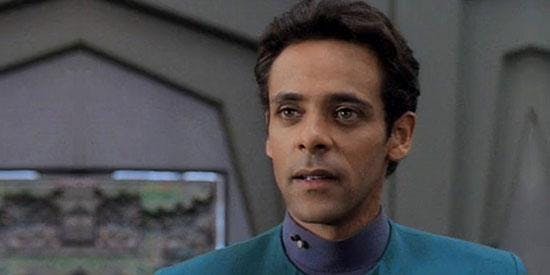
It’s amazing, and I hear about fans who have passed away, and we have letters of condolence. We’ve gone through our lives together. People get cancer, all of these things. You just never expect to get this close to people who you don’t really know, but it happens because of conventions, and a website and various other things I’ve got going on. I really like doing the conventions. I don’t have the energy to do lots, and I really believe that if I did more than one or two a year, it wouldn’t be special. So I try and keep myself like the proverbial girl at the party who just says no, the hard-to-get girl.
Let’s pretend that we can arrange for you to play Bashir one more time, for one more episode. What would you want to explore?
Good question. I probably wouldn’t leave the same subject that the show always explored, especially when it came to Julian, and that’s the humanity, the humanness. And it was done in a sci-fi setting. I still love that. I still love the difficult question, the question of “At which point does the means stop justifying the ends?” That’s what I’d want to explore.
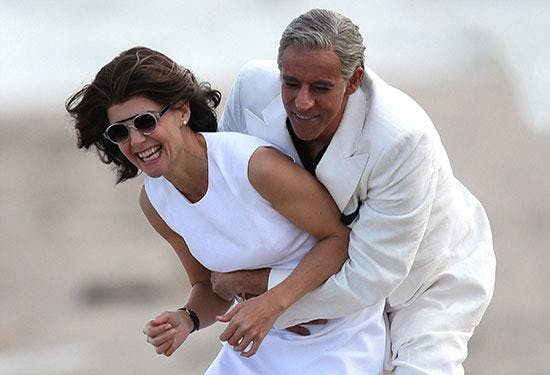
You just completed work on The Kennedys: After Camelot. What can you tell us about that?
It’s a sequel to a show that was done a couple of years ago with Katie Holmes, playing Jacqueline Kennedy. So this one picks up where that last one left off. Kennedy was assassinated and Bobby Kennedy was about to run as a presidential nominee, and that’s where we start. And they needed an Aristotle Onassis, so I’m playing Aristotle, Ari.
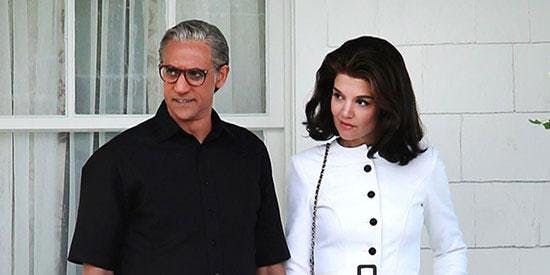
What did you want to capture of Onassis? You don’t resemble him in real life, so we’re guessing they’re doing a huge makeup job on you...
That’s absolutely true. I worked with the same production company shooting Tut a couple of years ago, and I was by the pool when the chief publicist on that, who is married to one of the producers, said, ‘What do you think about Aristotle Onassis?’ My first thought was, “You should get Javier Bardem, because I look nothing like him.” Javier just looks much more like my idea of Onassis. I don’t know whether they went to Javier or not, but they came back to me in September of last year and said, “Well, let’s do it. And we’re going to put you in a fat suit, and you’re going to wear some prosthetics.” And that’s exactly what I do. I’ve got this fat suit and prosthetics, and they’ve done quite a remarkable job, I have to say. It’s crazy.
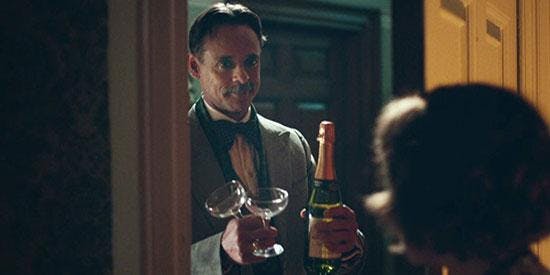
And you are also in Peaky Blinders. Give us an introduction to your character, Ruben Oliver. And were you a fan of the show?
I love that show, like so many people. And when I got the opportunity to come in and play this artist, I was like, “Yeah, let’s go. Let’s do it.” So off for a trip to Liverpool, where it was shot, ironically not Birmingham for whatever reason, and I got into the Peaky Blinders. I met all of these guys who have got a group on set. I walked in one day, arriving at work in the green room, and everyone is obviously there talking, except for this tight group that sat in a circle on chairs singing songs. And of course these are all of the actors who are the Peaky Blinders, and it’s amazing. It’s like, they are the Peaky Blinders on set and off set. They go around in a pack. I’m not a Peaky Blinder. I just kept my distance. I wasn’t quite sure what to make of it. Anything could kick off at any moment, so I was like, “Well, I’m going to just watch them.” It was amazing. I get to play Helen McCrory’s love interest, which is groovy, who is this London artist who falls in love with this… the only way I can put it is sort of a Mafioso matriarch. And it promises to be quite interesting, let me put it that way. Helen is a force of nature herself. She’s an incredibly daring actress, so when you do work with her on set she is liable to improvise, and it gets pretty hairy if you don’t hold on tight. You can get blown off the ride. We have a couple of pretty lurid sex scenes, and that was… I just had to let my mind go on vacation, and go wherever she led me, and it was pretty fun. It was pretty good.
IMDB lists Recon as a TV movie. But that was a busted Fox pilot, right?
It was. It was a busted pilot. It happened in Toronto in February or March of this year. So I’m back in Toronto for the second time so far. It was written and produced by this amazing young showrunner called Caroline Dries who wrote Vampire Diaries. It was a terrific idea, really brave, basically about an FBI agent who decides to go undercover, or is sent undercover, more appropriately, to a Muslim family who they believe are terrorist kingpins. And I didn’t get to find out much about it, because you never do when you sign up for a pilot. You see the pilot script, and that is it, unless you are the lead which maybe then they will give you more stuff. But I wasn’t the lead. I was the head of the Muslim family, the patriarch. Sarita Choudhury was in it, and Tracy Spiridakos, I think her name is, a fantastic Greek name, was the lead. We had a tremendously good time, and it’s kind of a brave idea. That’s one of the reasons why I did it, because the five members of the family were to be series regulars, so they were going to be around for a while. I was like, “I’m really intrigued. Where is this going to go? This girl is coming in undercover, says she works as the assistant to my wife on the show, played by Sarita, and they are planning to go with this for several seasons?” I just had to go, “Yeah, OK. I’m curious. I want to know where you’re going to go with this.” Apparently, it tested really well, but I think five brown people, a Muslim family as series regulars… I’m not sure there was a kind of appetite for it. There may be other factors that influenced their decision-making process.
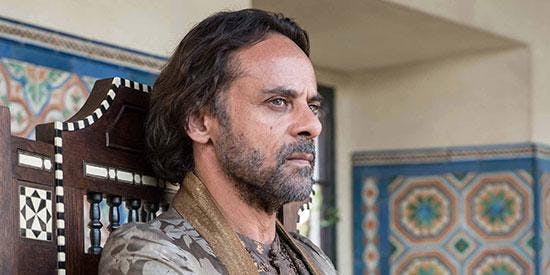
You had a nice run on Game of Thrones. What was that whole experience like, to shoot a show so far away, to be on a series as popular as that? Obviously, Trek was popular, but with DS9, nobody knew what it was going to be. You arrived at Game of Thrones when it was a full-fledged phenomenon. And, as secretive as Trek could be, Game of Thrones is even more so…
Oh, god, yes. But the whole landscape has changed, and everything is a secret now. Everybody is paranoid about some leak on Facebook or Instagram or YouTube. The internet has changed the landscape since 1992. Pretty much you had a blog with no pictures in 1992, and you couldn’t really get anything exciting on the web. But now you can leak pictures and footage, and people can get the episodes and the scripts and whatnot. So I think the secrecy is kind of understandable, but also there is an element of hype about it that makes it… the more secretive it is, the more special it is. And certainly Game of Thrones plays that. They misinform the crowd and they give them tidbits to send them in wrong directions. So, for example, last season, I believe that the first few episodes were stolen and downloaded online, and everybody got to see them before the show actually aired, and everybody was furious at HBO and whatnot. I don’t know if you remember. I am almost positive that those four episodes were leaked by HBO themselves. So there is an enormous amount of spin going on. I can’t tell you that for sure; that’s just my opinion, but it’s games; everybody’s playing these games.
So I knew this was going to be happening. It kind of started around 2004 from my recollection. Around that time, I was shooting Kingdom of Heaven, and that was the first time I got “Top Secret” on the script, and everybody’s got to be quiet about this, and no one can mention anything about the part and whatnot, and it just spiraled. So Game of Thrones is kind of the king of secrecy and spin and mystery and intrigue, as far as fans are concerned. Because there is such an appetite for gossip, everybody was asking me, “Is Jon Snow dead?” I was like, “I don’t know, he might be.” The only thing that was impossible and difficult was last season when I did it, I knew Jon Snow was dying because I got the scripts. I couldn’t even tell my wife, so it was infuriating. I don’t like walking around with secrets. I can’t stand it. You just make a deal with the devil.
And going on to the show was really quite exciting because it was such a huge thing, and there was so much publicity money. People were saying, “Right, we’re all going to go to South America next week and talk to — let’s get the airline sorted out.” And I’m like, “My goodness, you’re just throwing this dough around, this cash.” So everything was really top-notch, and when we got out on set the crew was spectacularly good. They picked the best crews in the world, and there were two of them. It was so huge. That’s what I remember, everything was so huge. And actors praying they weren’t going to be killed.
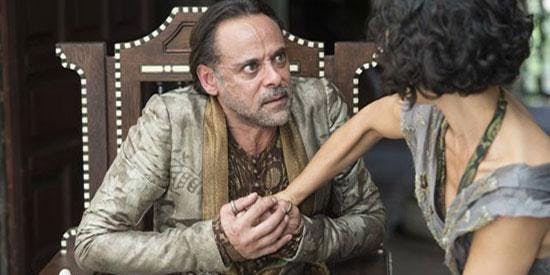
Our prince did not meet a pleasant end...
He didn’t. It’s funny, I’m not really sure what happened there. I was contracted to do at least four episodes this season, but then I was in L.A. doing publicity for something else, and I got a call at the Chateau Marmont and there were familiar voices on the other end of the phone. It was one of those guys, and because they didn’t introduce themselves it was like, “Hi, it’s me.” I was like, “Is that David or Daniel?” Anyway, they said, “You know what this phone call is about.” I was like, “Yeah, well, I guess I do.” “So we were going to kill you off at the end of last season, but we decided that we’re going to have to kill you off at the beginning of next season.” I was like, “Okay, life goes on.” But there was something wrong about that because I had been contracted for four episodes in the following season, so if they were going to kill me off at the end of the last season why would they contract me for those four episodes? Because it costs them money whether I do them or not, so it’s not great business sense to do it just in case.
So something happened; I have no idea what. There was an enormous amount of fan excitement when I got named to be on the show, and everyone was like, “Oh my god, yes, Doran Martell. He’s going to be great as Doran Martell.” That might have been the kiss of death. Maybe they didn’t want quite that much attention on that character. Maybe they thought, “Well, let’s prove that we’re going to stray from the books. We’re going to do something else, and he will be our first example of that.” So maybe that could have been the case. Or maybe I just screwed up. Maybe I said the wrong thing to the wrong person.
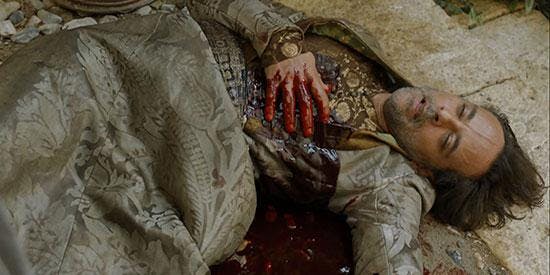
Maybe you leaked the episodes?
Maybe I leaked the episodes! People were coming up to me, you can imagine… thousands of people coming up to me in the streets, all over the place, going, “Oh my god, oh my god, it’s Doran Martell. Can I have a photo? What happens next season?” I was like, “Here’s my autograph but tomorrow you’re not going to want it because I’ll be dead, but I can’t tell you.” Anyway, it was one of those things. But I know that, from an actor’s point of view, professionally you don’t want to be on a show like that for too long, unless you are one of the top leads who originated the show, because your schedule gets kind of messed up. You don’t earn as much as you would if you were doing another show, because they’re Game of Thrones, and they don’t have to pay anyone. So it’s kind of a blessing in disguise. I just moved away, and being on it at all sticks, and everyone goes, “Oh, the guy from Game of Thrones!” It doesn’t really matter that you weren’t on it very long.
Visit StarTrek.com again tomorrow to read part two of our interview with Alexander Siddig. Destination Star Trek Europe will be held October 7-9 at the NEC Birmingham. Go to www.destinationstartrek.com for details.

